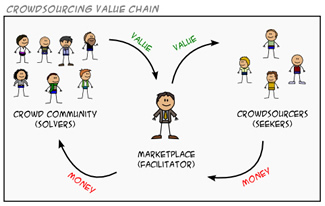 Crowdsourcing has become popular topic in technical communication in recent years, with crowdsourced projects appearing in disciplines ranging from technical writing to industrial design. But is it a viable trend in the technical translation field?
Crowdsourcing has become popular topic in technical communication in recent years, with crowdsourced projects appearing in disciplines ranging from technical writing to industrial design. But is it a viable trend in the technical translation field?
Just ask the people behind Ackuna, a website/social network that offers free translation services for text, mobile game apps and websites. They claim that crowdsourced translation – a pool of translators converting projects into multiple languages in a peer-reviewed environment, with the best translation chosen by the client – is the next great advance in technical communication.
Ackuna’s founder, Alex Buran, says that Ackuna stands out from online translation services such as Google Translate and BabelFish by forgoing machine translations and teaching users language and translation skills – what he calls the “learn by doing paradigm.”
“We made Ackuna to make Google Translate and BabelFish irrelevant,” Buran says. “We are not providing instant machine translation, neither are we going after professional translations. We are a blend of the technologies of crowdsourcing and language learning that is optimized toward committing to a big goal: building the world’s largest translation memory.”
Matt Bramowicz, Ackuna’s Vice President of Marketing, says that crowdsourced translation creates better, cheaper work by using the talents of a diverse pool of translators without the financial burden of having to hire or fire them.
“Crowdsourcing can be particularly useful within the translation industry, as it provides the opportunity to easily reach users from varying backgrounds and language groups and therefore harness the crowd to deliver faster and less expensive translations.”
 An offshoot of the New Jersey-based translation agency Translation Cloud, Ackuna’s business model is simple: Create an account, indicate your project’s target language, and upload the project files to the “crowd”. The site’s users (about 6,000 to date) select the project from a database and submit their edits for peer reviewing. You can then choose which translation you want, for free.
An offshoot of the New Jersey-based translation agency Translation Cloud, Ackuna’s business model is simple: Create an account, indicate your project’s target language, and upload the project files to the “crowd”. The site’s users (about 6,000 to date) select the project from a database and submit their edits for peer reviewing. You can then choose which translation you want, for free.
Translators communicate with the platform through private messaging and voting each others’ projects up or down. They don’t get paid, but they can increase their professional profile by gaining “reputation points” listed on their site profiles. If they get enough of those points, they can try out for paid work on the site.
Bramowicz says that Ackuna fills a need in the mobile app market for high-quality translations in over 20 languages.
“We knew that apps were extremely popular, however we noticed that multilingual versions were few and far between,” he says. “This could be for a variety of reasons, but most likely due to the fact that a lot of apps are created by individuals or small teams on a small budget. So they might not have the budget to translate their apps, or even the knowledge of how to go about getting it done. We wanted to create a system that would simultaneously bring translators and developers together in an effort to bridge the language gap online and make it easy and free for developers to translate their apps so that multilingual apps will become the norm rather than the exception.”

Image source: Torbjørn Marø, copyright 2009, on Flickr.com
Crowdsourcing also helps Ackuna’s bottom line: Buran says the practice rids the company of the need for suppliers and overhead. The company operates on a pay-per-word revenue model, in which they charge clients higher rates and pay freelancers lower ones.
Some experts in the translation field view crowdsourced translation with skepticism, however. According to Hans Fenstermacher, CEO of The Globalization and Localization Association (GALA), crowdsourcing may be a viable option for translation, but it comes with hidden costs.
“Most companies have realized that there is a substantial ‘cost’ associated with doing crowdsourcing properly,” he says. “Oversight and management of a crowdsourcing approach can be much more burdensome than in traditional translation projects. Crowds often can get translation done faster than “traditional” translation, but almost always that is because of the enormous demand for the content and passion for the subject (for example, in gaming or social media), and then only if the systems are in place to let the crowd work harmoniously and quickly.”
Fenstermacher says that crowdsourcing works best “when content is too voluminous, has too short a shelf-life, or is for some reason not commercially viable enough, for example, in languages of lesser profusion”.
Buran disagrees, noting that Ackuna’s system of peer reviewing keeps errors to a minimum, and helps foster innovation by rewarding good work (when users vote projects up) and discouraging bad work (when they vote them down).
“Each correct segment gets voted up while incorrect segments are voted down. This helps to weed out bad apples from good ones,” he says. “Additionally, Ackuna can provide context to translation if project creators upload app screenshots. This way translators can get the right meaning of translation by looking at the exact place on the app where this translation will appear and what context it will be.”
Ackuna has projects in the works such as RankUp, an app that lets developers monitor their rankings across app stores, and Airport Android app, which will be written for all major airports. Bramowicz believes that the more translators get involved, the more the company – and crowdsourced translation itself – will evolve and improve.
“The more exposure we have, the more it benefits both the volunteer translators and developers who use Ackuna already, as well as draw more newer users. The system works comparatively with the number of engaged users. The more users we have, the better it works for everyone.”